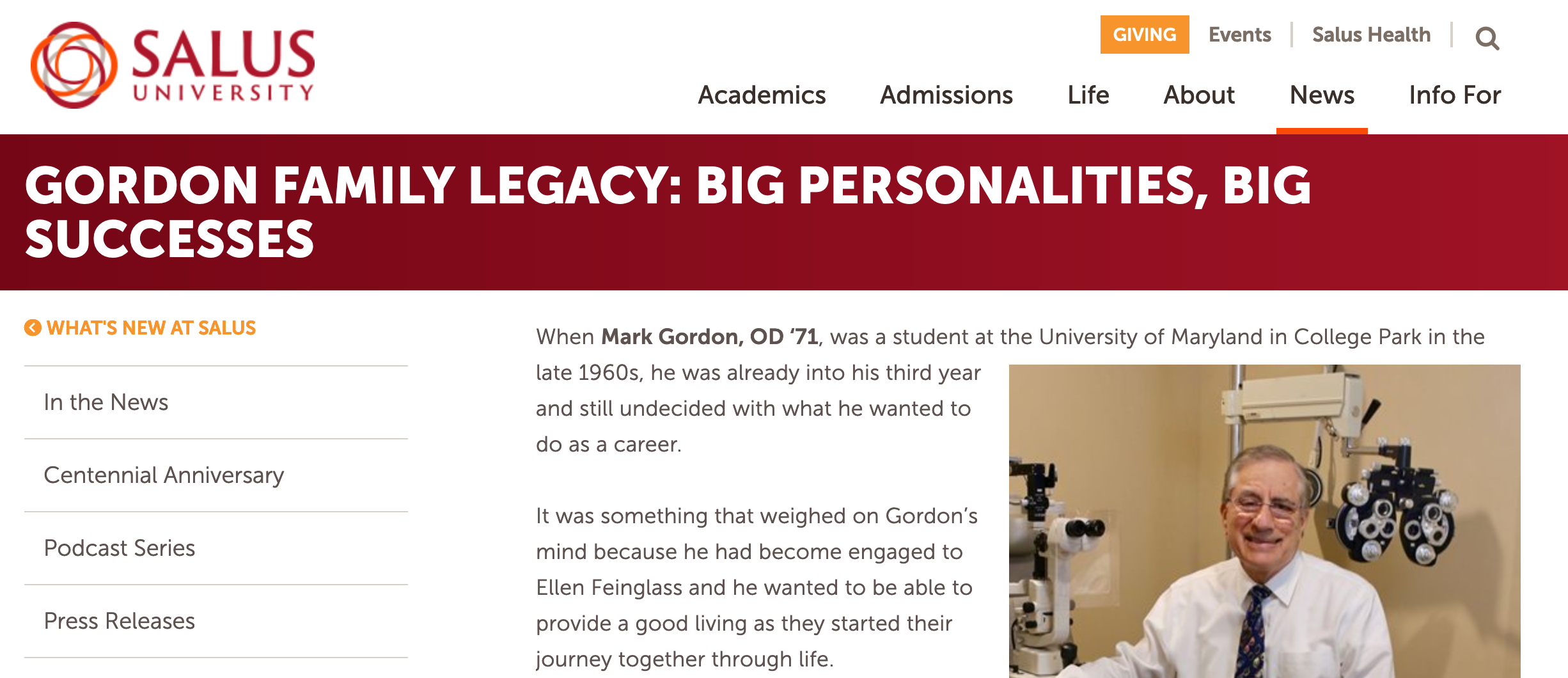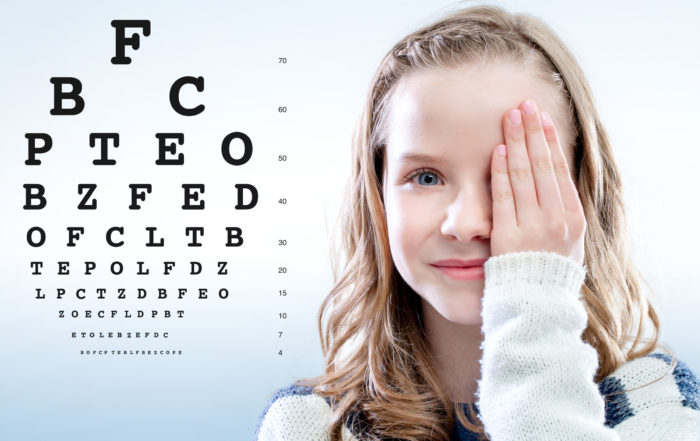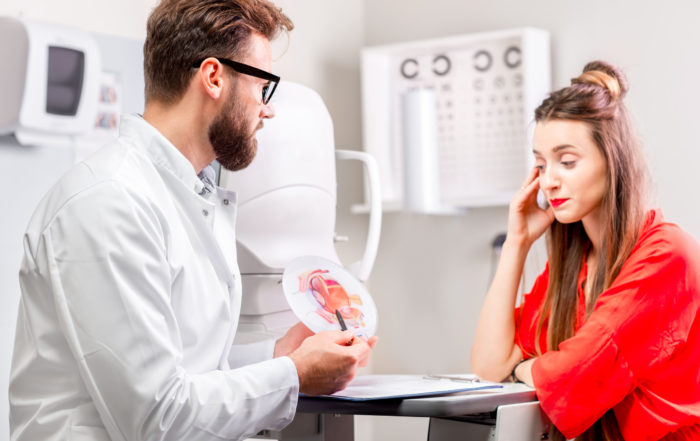Taking Care of Your Eyes
Periodic eye and vision examinations are an important part of preventive health care. Many eye and vision problems have no obvious signs or symptoms, so you might not know a problem exists. Early diagnosis and treatment of eye and vision problems can help prevent vision loss. Some common eye conditions include:
MYOPIA (NEARSIGHTEDNESS)
Nearsightedness, or myopia, as it is medically termed, is a vision condition in which near objects are seen clearly, but distant objects do not come into proper focus. Nearsightedness occurs if your eyeball is too long or the cornea has too much curvature, so the light entering your eye is not focused correctly.
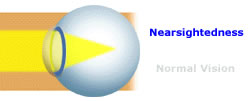 Nearsightedness is a very common vision condition that affects nearly 30 percent of the U.S. population. Some evidence supports the theory that nearsightedness is hereditary. There is also growing evidence that nearsightedness may be caused by the stress of too much close vision work. It normally first occurs in school age children. Since the eye continues to grow during childhood, nearsightedness generally develops before age 20.
Nearsightedness is a very common vision condition that affects nearly 30 percent of the U.S. population. Some evidence supports the theory that nearsightedness is hereditary. There is also growing evidence that nearsightedness may be caused by the stress of too much close vision work. It normally first occurs in school age children. Since the eye continues to grow during childhood, nearsightedness generally develops before age 20.
A sign of nearsightedness is difficulty seeing distant objects like a movie or TV screen or chalkboard. A comprehensive optometric examination will include testing for nearsightedness. Your optometrist can prescribe eyeglasses or contact lenses to optically correct nearsightedness by altering the way the light images enter your eyes. You may only need to wear them for certain activities, like watching TV or a movie or driving a car, or they may need to be worn for all activities.
Refractive surgery or laser procedures are also possible treatments for nearsightedness as is orthokeratology. Orthokeratology is a non-invasive procedure that involves the wearing of a series of specially-designed rigid contact lenses to progressively reshape the curvature of the cornea over time.
HYPEROPIA (FARSIGHTEDNESS)
Farsightedness, or hyperopia, as it is medically termed, is a vision condition in which distant objects are usually seen clearly, but close ones do not come into proper focus. Farsightedness occurs if your eyeball is too short or the cornea has too little curvature, so light entering your eye is not focused correctly.
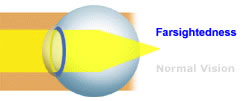 Common signs of farsightedness include difficulty in concentrating and maintaining a clear focus on near objects, eye strain, fatigue and/or headaches after close work, aching or burning eyes, irritability or nervousness after sustained concentration. Common vision screenings, often done in schools, are generally ineffective in detecting farsightedness. A comprehensive optometric examination will include testing for farsightedness.
Common signs of farsightedness include difficulty in concentrating and maintaining a clear focus on near objects, eye strain, fatigue and/or headaches after close work, aching or burning eyes, irritability or nervousness after sustained concentration. Common vision screenings, often done in schools, are generally ineffective in detecting farsightedness. A comprehensive optometric examination will include testing for farsightedness.
In mild cases of farsightedness, your eyes may be able to compensate without corrective lenses. In other cases, your optometrist can prescribe eyeglasses or contact lenses to optically correct farsightedness by altering the way the light enters your eyes.
ASTIGMATISM
Astigmatism is a vision condition that occurs when the front surface of your eye, the cornea, is slightly irregular in shape. This irregular shape prevents light from focusing properly on the back of your eye, the retina. As a result, your vision may be blurred at all distances.
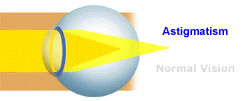 People with severe astigmatism will usually have blurred or distorted vision, while those with mild astigmatism may experience headaches, eye strain, fatigue or blurred vision at certain distances. Most people have some degree of astigmatism. A comprehensive optometric examination will include testing to diagnose astigmatism and determine the degree.
People with severe astigmatism will usually have blurred or distorted vision, while those with mild astigmatism may experience headaches, eye strain, fatigue or blurred vision at certain distances. Most people have some degree of astigmatism. A comprehensive optometric examination will include testing to diagnose astigmatism and determine the degree.
Almost all levels of astigmatism can be optically corrected with properly prescribed and fitted eyeglasses and/or contact lenses.
Corneal modification is also a treatment option for some patients.
From Our Trusted Partners
RECENT ARTICLES

My husband, granddaughter and I have been patients of Dr. Joshua Gordon’s for at least 15 years. I would highly recommend Barenburg Eye Associates for anyone interested in state of the art eye care with a personal touch.

The team at Barenburg Eye is among the very best in the area. They take the time to assess your individual needs such as preference on contacts or glasses and provide a range of options that I have never seen with a competitor. There is simply no other professional that could ever compare!

My family and I have been going to Barenburg Eye Associates for over a decade. The staff is very attentive and takes the time to provide us with the best care, and to educate us about the examinations as well. I could not imagine going anywhere else!


